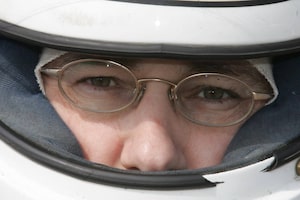A few years ago, Formula One ringmaster Bernie Ecclestone landed in hot water when he lauded Adolf Hitler for getting things done while also asserting democracy hasn't done much for anyone.
Although the diminutive the 82-year-old's grip on political realities might be seen as tenuous by many, it's difficult to argue that the autocratic model he praised hasn't worked wonders inside the F1 paddock.
After acquiring the commercial rights to the sport 35 years ago, the F1 boss has made all the team owners rich beyond their wildest dreams. Ecclestone also made off like a bandit, creating a $4-billion empire that puts him 12th on the richest Briton list.
In fact, the two most-successful racing series on the planet, F1 and NASCAR, have centralized power structures where team owners have little say in day-to-day operations or the regulations that govern the sports.
In F1, teams all sign a commercial agreement with Ecclestone's Formula One Management, which outlines the money they get for competing in the series. When it comes to rules, teams have some input through a technical committee, but the final say goes to the sport's governing Fédération Internationale de l'Automobile.
NASCAR is much the same, although the France family controls just about everything with Brian France running NASCAR, while his sister Lesa France Kennedy heads the International Speedway Corp., which owns most of the racetracks that host NASCAR events. The France family stock car dictatorship of the still-private NASCAR has the clan's net worth somewhere around $3-billion.
While those in F1 and NASCAR piled up profits, the Hulman-George family's Hulman & Company, that owns the Indianapolis Motor Speedway (IMS) and controls IndyCar, bled money as its series limped along.
It should come as no surprise then that one of IndyCar's most powerful owners, Roger Penske, was quoted last week insisting that the series needs strong leadership to help it get back on track. Essentially, Penske suggested IndyCar needs someone with a NASCAR-style "take it or leave it approach" who will tell owners how things will work and let them decide if they want to stay.
Penske was underlining the fact that many feel the Hulman-George clan hasn't exactly displayed strong leadership skills over the past two decades. It was commonly thought that the series reversed that trend when Randy Bernard became IndyCar boss in 2010 after 15 years as head of the Professional Bull Riders. Previously, he had taken professional bull riding from the fringes to a sport being broadcast to 500 million households around the world annually. Although Bernard's arrival wasn't met with much fanfare, his open style and marketing savvy quickly won him support.
While he was hugely popular with fans and media, it was a different story with some owners, who complained about the cost of parts for the new car introduced in 2012, as well as his moves to replace tire manufacture Firestone with another rubber supplier.
Bernard was booted late last year and IndyCar has been without a permanent chief executive, leaving a void in the top job as the series looks for a replacement. Regrettably, the circumstance of his exit doesn't bode well for the series finding a strong leader who will actually take the job. He was ousted in a coup d'état launched by a group of dissatisfied owners and replaced by the guy who listened to them, namely IMS chief executive Jeff Belskus. So, anyone now considering the job would have to think long and hard about how much support they'd get from the Hulman brass if push came to shove.
On the positive side, the new Hulman and Co. chief executive, Mark Miles, seems to be taking all the right steps before making any long-term decisions. Oddly, motorsport newbie Miles seems to be in exactly the same space that Bernard occupied three years ago when he arrived as IndyCar chief executive. Prior to heading Hulman, Miles was chairman of the 2012 Super Bowl committee that brought the big game to Indianapolis. Previously, he spent 15 years as head of the Association of Tennis Professionals.
And while Bernard may have fallen afoul with the series owners, his hand can be seen all over the on-track success IndyCar had last year, something which continued in the 2013 season opener in St. Petersburg, Fla., two weeks ago won by Canadian James Hinchcliffe.
Under his watch, IndyCar unveiled a new Dallara chassis, brought two new engine manufacturers on board, Chevrolet and Lotus (which left after one dismal season) to join Honda, and opened a Hollywood office to boost its visibility. He also came up with the doubleheader idea that will make its debut in Detroit next month and be the format on the streets of Toronto in July. A third doubleheader weekend will go later in the season in Houston.
Ironically, Bernard's greatest triumph as the Series' boss may come months after his exit when IndyCar/Indy 500-themed animated film Turbo hits movie screens across the U.S. in July. It may do for IndyCar what the 1990 film Days of Thunder did for NASCAR's profile.
While Bernard's influence still guides the series and his ejection remains fresh in the mind, finding a strong leader who can whip the owners into shape will not be easy. In fact, many might argue that Bernard had the leadership thing going pretty well because the owners were complaining and he still got turfed.
Unfortunately, after getting their way when it came to Bernard, Hulman's board created a precedent that signalled a power shift toward its team owners. With a successful coup recently executed on the series' previous leader, it's not unreasonable to think that they won't take kindly to anyone who wants them to toe the line and will instead go over his or her head – again – and expect action. And, sadly, that's a scenario not conducive to strong leadership or success.
For more from Jeff Pappone, go to facebook.com/jeffpappone (No login required!)
Twitter: @jpappone
 Jeff Pappone
Jeff Pappone